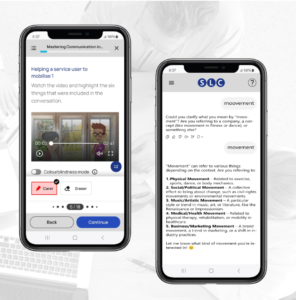
SLC win Ufi grant to develop AI language learning app for social carers
We’re delighted to have won a grant from Ufi VocTech Trust to develop an AI-driven technology solution that provides cheap phone-based language and communication skills

Formal language is appropriate when you’re speaking in a professional situation. But what exactly is formal spoken English, and how should you use it?
Over the next few weeks you’ll learn more about the specifics of using formal spoken Medical English. Below are a few general tips for using the correct register when you’re interacting with a patient or client. It’s useful for your everyday professional life, and it’s essential for passing the OET speaking exam.
The appropriate use of slang is difficult to judge even for a native speaker. Never use it in formal English. How do you know if the new word you’ve heard is slang? Well, if you’ve picked it up from social media, the chances are that it is. Go for simple, clear language that everyone can understand.
Forget what you might have learned. In spoken English – formal or informal – using contractions is essential. Saying it’s, doesn’t, or I’d will make you sound more fluent and at ease, and it’s the way native speakers talk. However, don’t do this if it’s more difficult for you to be understood. Better to say we are rather than we’re if it helps your meaning come across.
Perhaps you think the phrases Would you mind…? or Could I possibly …? are too time-consuming to learn. But to native English speakers, they sound like politeness. Of course, you’re entitled to say Can you…? or even Do this. Some people prefer the direct approach. But in general, politeness = formal English. If you can get your mouth around such long phrases, try them.
If you’re unsure, prioritise formal over informal English, because stilted is better than over-familiar. As a medical professional, you don’t want to come across as if you’re chatting over the garden fence.
Watch this video from SLC to learn about using appropriate language for the OET. And for more hints and tips on passing the OET speaking exam, check out SLC’s guide here.

Stephanie Lam is a writer, journalist, and English teacher. She specialises in writing fabulous words for the wellbeing and health industries.
SLC was the OET-accredited Premium Preparation Provider in Europe and is the leading provider of OET preparation services to the UK National Health Service.
SLC offers a wide range of OET preparation services, including self-study, tutoring, practice tests, and writing correction.
Get updates and get the latest materials on Medical English, OET and IELTS

We’re delighted to have won a grant from Ufi VocTech Trust to develop an AI-driven technology solution that provides cheap phone-based language and communication skills

We’re delighted to announce a partnership with leading Medical English app, Doxa.
